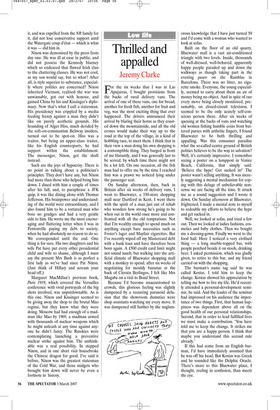Thrilled and appalled
Jeremy Clarke
For the six weeks that I was in Las Apujarras, I bought provisions from the backs of rural delivery vans. The arrival of one of these vans, one for bread, another for fresh fish, another for fruit and veg, was the most exciting thing that ever happened. The drivers announced their arrival by blaring their horns as they coasted down the mountainside, and all the old crones would make their way up to the road at the top of the village, in a kind of hobbling race, to meet them. I think that in their view a man doing his own shopping is a contemptible thing. They barged in front of me blatantly, and I was generally last to be served, by which time there might not be a lot left. On one occasion, all the fish man had to offer me by the time I reached him was a prawn we noticed lying under the passenger seat.
On Sunday afternoon, then, back in Britain after six weeks of delivery vans, I went to Bluewater, a 330-store shopping mall near Dartford in Kent. I went there with the spirit of a man just out of rehab who wonders how strong he’s going to be when out in the world once more and confronted with all the old temptations. Not that I’m wealthy enough to spend much on anything except bare necessities such as Foster’s lager and Mayfair cigarettes. But I’ve recently wiped off my Mastercard debt with a bank loan and have therefore been born again. A £500 credit card limit might not sound much, but walking into the artificial climate of Bluewater shopping mall with a monkey to spend, after six weeks of negotiating for mouldy bananas at the back of Citroën Berlingos, I felt like Mrs Mugabe on a visit to Bond Street.
Because I’d become unaccustomed to crowds, this glorious feeling was slightly dampened by a recurring paranoid delusion that the showroom dummies were shop assistants watching my every move. It was dampened still further by the unglam orous knowledge that I have just turned 50 and I’d come with a woman who wanted to look at sofas.
Built on the floor of an old quarry, Bluewater mall is a vast air-conditioned triangle with two levels. Inside, thousands of well-dressed, well-behaved, apparently happy people paraded up and down the walkways as though taking part in the evening paseo on the Ramblas in Barcelona. There was no litter, no cigarette smoke. Everyone, the young especially, seemed to carry about them an air of money being no object. And in spite of our every move being closely monitored, presumably, on closed-circuit television, I seemed to be the only acutely self-conscious person there. After six weeks of queuing at the backs of vans and watching old women fishing humble coins from battered purses with arthritic fingers, I found Bluewater to be both thrilling and appalling. Was this consumer paradise what the so-called centre ground of British politics believes to be the way to salvation? Well, it’s certainly impressive. I remember seeing a poster on a lamppost in Venice Beach, California, that simply said: ‘Believe the hype! Get sucked in!’ The poster wasn’t selling anything. It was merely suggesting a mental mechanism for coping with this deluge of unbelievable nonsense we are facing all the time. It struck me as a sound suggestion and I wrote it down. On Sunday afternoon at Bluewater, frightened, I made a mental note to myself to redouble my efforts to believe the hype and get sucked in.
Well, we looked at sofas, and tried a few out. Then we looked at ladies fashions, cosmetics and baby clothes. Then we bought me a dressing-gown. Finally we went to the food hall. Here I noticed a very civilised thing — a long marble-topped bar, with people perched beside it on stools, drinking beer. I asked permission, which was gladly given, to retire to this bar, and my friend carried on with the shopping.
The barman’s name tag said he was called Kostas. I told him to keep the change. Kostas showed his appreciation by telling me how to live my life. He’d recently attended a personal-development seminar, he said. And the leader of the seminar had impressed on his audience the importance of two things. First, that human happiness was dependent above all on the good health of our personal relationships. Second, that in order to lead fulfilled lives we must make a contribution. ‘You have told me to keep the change. It strikes me that you are a happy person. I think that maybe you understand this second rule already.’ If this had come from an English barman, I’d have immediately assumed that he was off his head. But Kostas was Greek and he sounded like the Delphic Oracle. There’s more to this Bluewater place, I thought, reeling in confusion, than meets the eye.










































































 Previous page
Previous page